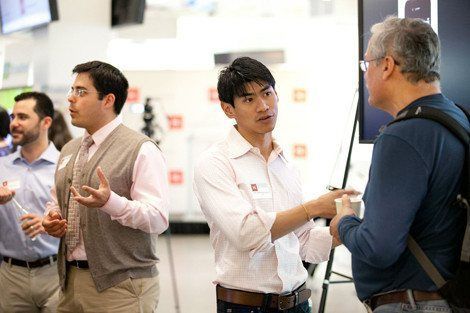May 28, 2013 — A proposal for a mobile phone app to help college students manage their sexual health was named second runner-up in Harvard’s inaugural Deans’ Health and Life Sciences Challenge, hosted by the Harvard Innovation Lab (i-Lab). The mobile phone app proposal came from one of two teams with HSPH students represented that were among eight finalists vying for funding in the competition. The other team had proposed a program linking vehicular trauma patients in Bangladesh to first responders and emergency transportation.
HSPH students were represented on eight of the 54 teams that submitted proposals for the competition. Grand-prize winners and runners-up took home a share of a $75,000 purse.
The challenge invited Harvard students and postdoctoral fellows from across the University to develop entrepreneurial solutions that facilitate the delivery of affordable health care and the development of new and effective therapies for people around the world. Finalist teams earned $5,000 to invest in their projects, and another six weeks to hone their pitches. They also were given access to workspaces at the i-Lab and the opportunity to consult with venture capitalists and other advisors. Video pitches from each of the finalists were reviewed by a panel of judges, with the results announced at the i-Lab on May 22, 2013.
Team SQ
The SQ mobile phone app, aimed at college students, invites users to “Verify your sexual health intelligence.” With a few swipes of the finger, students can educate themselves about sexually transmitted diseases (STDs), answer questions to determine their personal level of risk, and find a clinic on their campus where they can get tested. Users who have been tested can have their provider securely send the encrypted results to their mobile device. The app then displays a time-stamped checkmark that users can show to their partners verifying that they are up-to-date on their tests. In the future, the team hopes to integrate the app with online dating sites.
“Most STDs are asymptomatic,” said Fah Sathirapongsasuti, PhD ’13, who is earning his degree in biostatistics at HSPH. “If people don’t get tested, they are unaware that they are spreading disease.” STDs are particularly prevalent in young adults under 25.
“Our solution is to promote a healthy lifestyle and a proactive testing regimen,” said Agustin Mohedas, a PhD candidate in the Harvard-MIT Division of Health Sciences and Technology. “People are reactive. They get tested when they’ve done something risky or because they’ve developed symptoms that they think might be from a sexually transmitted infection.” This app encourages sexually active students to get tested on a regular schedule based on their personal risk profile, he said, a strategy recommended by the U.S. Centers for Disease Control and Prevention.
Sathirapongsasuti and Mohedas met while taking a health care ventures course at MIT last fall. They initially discussed developing a mobile phone app to incentivize men in Uganda to get tested for HIV, but decided to pilot a project closer to home that they could ultimately take global. Lawyer Noah Metheny, MPH ’12, served as one of the team’s advisors.
Buoyed by their second-runner-up win, Team SQ will now proceed with plans to partner with Harvard and MIT’s student health services to pilot the app. The team is also exploring opportunities for growing their business through local technology incubators and investors. “We are very excited to have this momentum behind us so we can further develop our idea and product,” said Sathirapongsasuti.
Team TraumaLink

Rates of traffic fatalities in Bangladesh are among the worst in the world, and it’s no wonder — major roads are an overcrowded and chaotic tangle of cars, bicyclists, and pedestrians. There is little enforcement of traffic laws and no emergency medical service.
HSPH global health students Jon Moussally, MPH ’13, Ryan Fu, SM ’14, and Eric Dunipace, SM ’14, witnessed this firsthand during an HSPH Winter Session course last January in Bangladesh and decided to do something about it. Moussally is an emergency physician with a decade of experience teaching acute resuscitation. Fu is a management consultant with experience working with hospitals and pharmaceutical companies in Asia. Dunipace is a researcher whose experience includes working in an HIV clinic.
Their project, TraumaLink, has two components: a training program in Bangladesh to teach basic first aid skills to health workers, interested community members, and students who can then serve as first responders, and a call center that will be open 24/7. When a traffic accident occurs, a trained operator will identify the location and details of the accident. They will dispatch responders to the crash site and help arrange transportation for the victim to a hospital with the capacity to deal with his or her injury.
The team aims to organize and augment resources that are already available in communities, and intends to work closely with local non-governmental organizations and other partners. They currently are in the process of identifying communities in which to pilot the program and will visit the country again in June.
The team has a funding model through which it hopes to provide services to patients for free. “We feel confident that by creating a project that creates heroes in communities we can offer an attractive channel for private sector advertising and sponsorships,” Moussally said. Within five years, the team hopes to be able to provide coverage to the majority of Bangladesh and will then begin expanding the project to other developing countries.
“The Challenge got us thinking about risk and reward, the business plan, the timeline,” said Fu. “Without it, we may not have started working on those things so quickly. We were happy to have the encouragement. It has already helped us along our path.”
Photos: Evgenia Eliseeva
